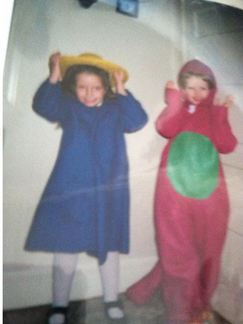
"Sisterly Support of Autism,"
By Kathryn McNamara
From childhood on I was always quite comfortable to reveal my brother's diagnosis to the world. I embraced it and made it a priority to talk about. Because I grew up with an autistic twin, autism surrounded me my entire life; I understood it and was readily open-minded to discuss it with any of my friends or family.
My twin brother Brian and I were always together as children. Whether it was at the birthday parties we shared, the activities we participated in together, or the various events or family and educational events we both attended, we always knew each other. We were a fragment of each other's identity. Of course, my mom's parenting style helped a lot and had a major role that made me realize it was essential to be involved with my brother. We both felt it was important for me to be comfortable to talk about his diagnosis with anybody. From the time we were young, I had an advanced understanding. I was always empathetic and passionate about autism because of the environment I grew up in. I was quite fortunate that I had the opportunity to spend quality time with my brother. Brian has limited speech, and because of this he would act out either very happily or he could suddenly turn angry. Often this would be when he could not handle a lot of stimuli or crowds of people that surrounded him. Of course that would attract attention, but nobody ever asked what happened or why he would act out because they knew he had autism. I always felt obligated to acknowledge that I had an autistic twin brother the minute I met someone because I felt Brian was a major factor to mention, and I immediately would elaborate on what autism was if the person inquired about it, and how it limited Brian’s ability to socialize the way I or any neurotypical individual would, but despite that, I accepted him, and was quite proud of him, and still am because he encourages me each and every day.
Today, I am willingly able to talk about Brian’s diagnosis, and I guarantee I always will be able to share my situation with others and hope to improve their overall understanding of autism. I am confident that I embrace autism and I am fortunate to be familiar with my brother's diagnosis from a young age and forever more.
Siblings with a Mission is a non-profit, international organization established to serve and support siblings of individuals with special needs. All images are found on Google images and are solely used for educational purposes. The stories and advice provided by Siblings with a Mission are not to be replaced by professional advice and counseling but to be considered as an additional source of support.
By Kathryn McNamara
From childhood on I was always quite comfortable to reveal my brother's diagnosis to the world. I embraced it and made it a priority to talk about. Because I grew up with an autistic twin, autism surrounded me my entire life; I understood it and was readily open-minded to discuss it with any of my friends or family.
My twin brother Brian and I were always together as children. Whether it was at the birthday parties we shared, the activities we participated in together, or the various events or family and educational events we both attended, we always knew each other. We were a fragment of each other's identity. Of course, my mom's parenting style helped a lot and had a major role that made me realize it was essential to be involved with my brother. We both felt it was important for me to be comfortable to talk about his diagnosis with anybody. From the time we were young, I had an advanced understanding. I was always empathetic and passionate about autism because of the environment I grew up in. I was quite fortunate that I had the opportunity to spend quality time with my brother. Brian has limited speech, and because of this he would act out either very happily or he could suddenly turn angry. Often this would be when he could not handle a lot of stimuli or crowds of people that surrounded him. Of course that would attract attention, but nobody ever asked what happened or why he would act out because they knew he had autism. I always felt obligated to acknowledge that I had an autistic twin brother the minute I met someone because I felt Brian was a major factor to mention, and I immediately would elaborate on what autism was if the person inquired about it, and how it limited Brian’s ability to socialize the way I or any neurotypical individual would, but despite that, I accepted him, and was quite proud of him, and still am because he encourages me each and every day.
Today, I am willingly able to talk about Brian’s diagnosis, and I guarantee I always will be able to share my situation with others and hope to improve their overall understanding of autism. I am confident that I embrace autism and I am fortunate to be familiar with my brother's diagnosis from a young age and forever more.
Siblings with a Mission is a non-profit, international organization established to serve and support siblings of individuals with special needs. All images are found on Google images and are solely used for educational purposes. The stories and advice provided by Siblings with a Mission are not to be replaced by professional advice and counseling but to be considered as an additional source of support.
